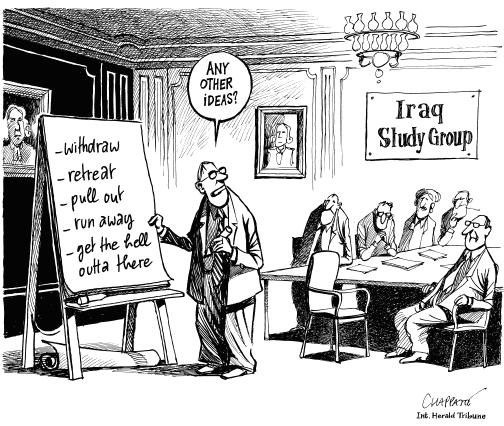Search
Recent comments
- arrest that man.....
2 hours 28 min ago - monstrous...
4 hours 58 min ago - chomsky's advice....
7 hours 28 min ago - destroying america....
10 hours 28 min ago - critic....
11 hours 30 min ago - talking....
12 hours 13 min ago - one nation's fairies....
13 hours 42 min ago - assassination....
13 hours 52 min ago - "error"...
15 hours 11 min ago - playground....
15 hours 12 min ago
Democracy Links
Member's Off-site Blogs
reality check .....

‘It is now commonplace for people like me, who supported the war, to say that we "did the right thing" but that it had mysteriously "turned out wrong". This is intellectually vacuous. It is like saying British strategy for July 1, 1916 was perfect, but let down by faulty execution. The thing was a disaster from the moment we invaded, and it wasn't poor old Rumsfeld's fault for failing to send in enough troops, or failing to do more "planning" for the post-war. No quantity of troops could have prevented this catastrophe; and the dreadful thing is that I think Saddam knew it.
A couple of years ago I had a chilling conversation with a very senior British general who was then intimately involved in our efforts in Iraq.
The trouble was, he said, that Saddam had thought it all through. He knew he hadn't a hope against the Pentagon, so he had a three-stage strategy. First he instructed his army not to put up much resistance to the Patton-like thrusts of the US army. Then, when Baghdad had fallen, he encouraged his soldiers to melt away to their homes and keep their weapons. The third stage, said this British general, was the one we had been embroiled in ever since: a guerrilla war, spiced with sectarian violence, to become gradually more intense until it became no longer possible for the allies to remain in Iraq.’
- By John Richardson at 26 Nov 2006 - 3:34pm
- John Richardson's blog
- Login or register to post comments
So cheap and so good, even the CIA sold it...
By Larry Kahaner
Sunday, November 26, 2006; B01
In the grand narrative of World War II, the Battle of Bryansk is a minor conflict, barely deserving of a footnote. But Bryansk has another place in history. It was there that a then-unknown tank commander named Mikhail Kalashnikov decided that his Russian comrades would never again be defeated. In the years following the Great Patriotic War, as Soviet propagandists dubbed it, he was to conceive and fabricate a weapon so simple, and yet so revolutionary, that it would change the way wars were fought and won. It was the AK-47 assault rifle.
"YOU REAP WHAT YOU SOW."
One of the major difficulty encountered by "UN" troops in Afghanistan is the supply of weapons from the US in whatever form for whatever purpose... An AK47 becomes as useful as a ladle to stir a pot on the boil and possibly easier to find or cheaper. The defeat of the Soviets in Afghanistan nearly 20 years ago is THE REASON why people like Bin Laden have cropped up over there in Afghanistan — and been propped up by the US, until the wind change and the seeds of war towards the Communist North, became the seeds of wrath towards the West.
turning the screw .....
from the weekend Australian …..
‘The former SAS officer who devised and executed the Iraq war plan for Australia's special forces says that the nation's involvement has been a strategic and moral blunder.
Peter Tinley, who was decorated for his military service in Afghanistan and Iraq, has broken ranks to condemn the Howard Government over its handling of the war and has called for an immediate withdrawal of Australian troops.
"It was a cynical use of the Australian Defence Force by the Government," the ex-SAS operations officer told The Weekend Australian yesterday.
"This war duped the Australian Defence Force and the Australian people in terms of thinking it was in some way legitimate."’
Iraq A Moral Blunder, Says War Hero
unmerrygoround
A. Alexander, November 26th, 2006There is no mistaking the fact that on November 7, the country took a wild swing leftward. It would, however, pose a serious threat to American democracy if Democrats and their supporters were to assume that the Neoconservatives have surrendered their fascist-like dreams. If anything, next time the Neocons make a political move it'll prove to be more dangerous than the current Bush administration.
Donald Rumsfeld, Richard Perle, Kenneth Adelman, and Paul Wolfowitz all had links to the Reagan administration. The Neoconservative strong armed approach to foreign policy, their penchant for deep and dark government secrecy, and their belief in an omnipotent Executive were all hallmarks of Reagan's administration ... only not nearly pronounced as those characteristics have been in the Bush White House.
Afghanistanatola
Pentagon and military officers say the list of nations with caveats, and the exact restrictions they have imposed, remains classified, to avoid helping Taliban fighters assess alliance weak points.
transformationato
By Paul Reynolds
World Affairs correspondent, BBC News website
US soldier at Afghan checkpoint
Nato in Afghanistan: role model?
The Nato summit in the Latvian capital Riga this week will be dominated by the war Nato is waging against the Taleban in Afghanistan and by the concept that Nato should increasingly take on a global role.
Both are part of the same vision - that Nato should develop from its traditional role as an alliance primarily interested in European and North Atlantic defence into a global player capable of acting and intervening anywhere. In the jargon this has become known as "transformation".